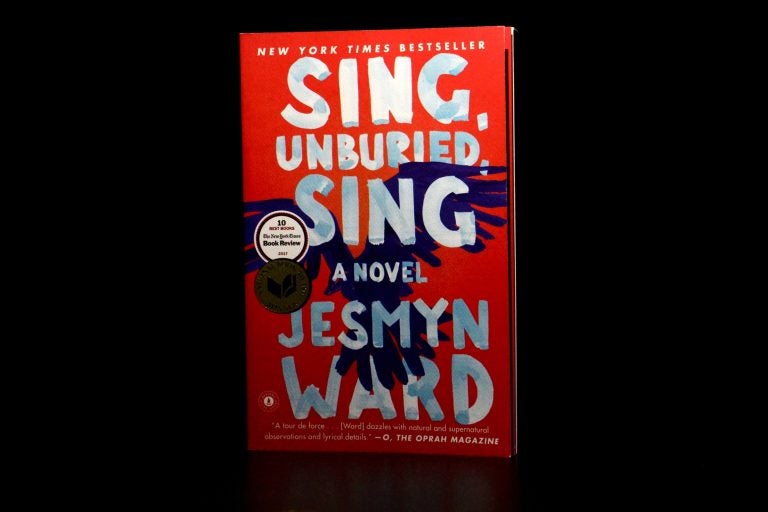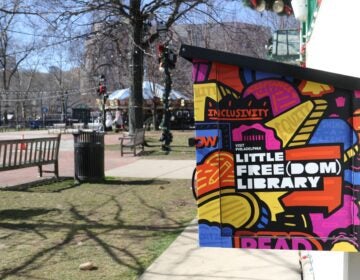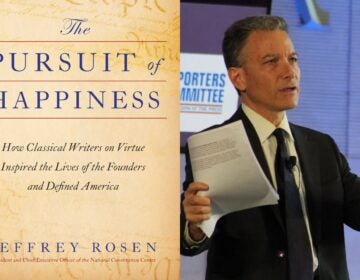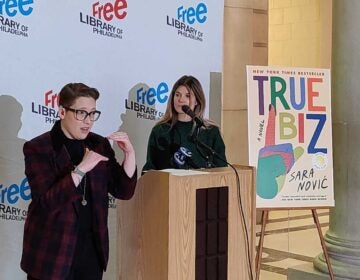Now read this: ‘Sing, Unburied, Sing’
The Free Library of Philadelphia has selected Jesmyn Ward's "Sing, Unburied, Sing" for next year's One Book, One Philadelphia reading program.

"Sing, Unburied, Sing" by Jesmyn Ward is next year's One Book, One Philadelphia selection. (Emma Lee/WHYY)
“Sing, Unburied, Sing” by Jesmyn Ward is the Free Library of Philadelphia selection for next year’s citywide reading program, One Book, One Philadelphia. Everyone in Philadelphia will be encouraged to read the book and participate in a series of public discussions and workshops next spring.
Published last year, “Sing, Unburied, Sing” won the National Book Award. As far as Ward is aware, this is the first time the book is being used for a citywide reading project.
The novel is about a black family in contemporary Mississippi who are dealing with problems that, unfortunately, are ageless: poverty, incarceration, drug abuse, and racism. The book is structured around a road trip: a mother on crystal meth is driving her children to Parchman Farm – the notorious Mississippi prison – to pick up their father who is being released.
Ward grew up in Mississippi and moved back to her hometown several years ago. As a child, she was haunted by Parchman Farm, which has a long history of holding African-Americans for petty crimes and forcing them into hard labor.
“When I was growing up, I would have bad dreams that all the men in my family were arrested and sent to Parchman. I was having this dream at 8 years old,” she said. “Children, especially black children of a certain socioeconomic status — I grew up poor — most children like me in this state know about Parchman. That prison casts a long shadow.”

The book begins and ends with violence.
It opens with the line: “I like to think I know what death is,” from the perspective of the 13-year-old protagonist JoJo, who is being asked to help his grandfather slaughter a goat. JoJo’s knowledge is tested in several ways.
Ghosts inhabit the story, and one takes over the narration for brief stretches. Richie, a 12-year-old who died many years earlier in Parchman Farm, strikes up a relationship with JoJo.
Before writing the book, Ward began researching the prison she thought she knew, and learned a lot of things she hadn’t.
“I had no idea children as young as 12 were charged with petty crimes like vagrancy or loitering, in the ‘20s and ‘30s, and sent to Parchman prison where they were re-enslaved,” she said.
Ward felt she needed more than a flashback, or some kind of literary memorial device, to bring in the stories of forgotten children into her novel. She needed a ghost.
“Children were robbed of their agency, they were worked as slaves,” she said. “I want that child to have agency, to appear and affect characters, not just be a memory. The only way to give a child the agency that they had been denied in life, is making that child a ghost.”
A supernatural element inside a story about American racism might be challenging for some readers, but Marie Field, chair of the One Book, One Philadelphia selection committee, said Ward’s extraordinary writing makes it work.
“Maybe by reading this book, Americans who can’t rest in peace – we live with the troubling aftereffects of slavery and racism — maybe it will help us progress with dealing with this dark side of history,” said Field.
The events related to the “Sing, Unburied, Sing” have not yet been scheduled, but they will begin in January when Ward visits Philadelphia for the launch. In the meantime, 1,500 copies of the book will be distributed in the city’s schools and hundreds will be sent to libraries.
WHYY is your source for fact-based, in-depth journalism and information. As a nonprofit organization, we rely on financial support from readers like you. Please give today.





